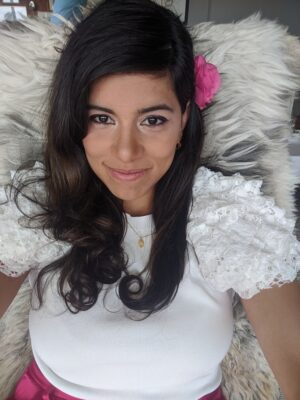 Talking about myself and telling my personal story is very tricky because when I start thinking about it, emotions, memories, and ideas invade my head. Sometimes it is not easy to translate them into words, especially when there has been some challenging periods.
Talking about myself and telling my personal story is very tricky because when I start thinking about it, emotions, memories, and ideas invade my head. Sometimes it is not easy to translate them into words, especially when there has been some challenging periods.
Seven years ago, I decided to start a family with a Norwegian man and moved from Colombia to Norway. My career, up to that point, was on its way up. Before leaving my country, I was the Communications Advisor for the Viceminister of Mines and Energy. I was confident about my robust profile, as I had acquired international experience by working for several global public relations companies and by studying for my Master’s in Spain and France. Moving to Norway with my background and speaking Spanish, English, and French, doors would open easily if not immediately, and would allow me to continue escalating in my international career. Or at least that was what I thought.
Reality was quite different. Suddenly, all my skills and experience were not valued. The doors hardly open to continue with the same professional path I had before. Instead, the job opportunities I was offered were more operative, in lower positions or even on activities that had nothing to do with my expertise. It felt like a professional setback like I was wasting my talent and abilities. It was hard to realize that I was seen as a nobody and could not get professional opportunities according to my education and experience.
My identity, mainly defined by my professional achievement and titles, fell to pieces.
The lack of professional opportunities was frustrating. On top of that, it was difficult to renounce my language and cultural codes, friends and family, food, comfort zone, and, most importantly, my dreams of having a career here.
While trying to adapt to Norway, I experienced an invisible wall between the local society and the newcomers. It seemed that being different or coming from abroad was not a plus. Instead, it felt like a minus.
No matter how much experience or studies I had before, I was not able to have the same opportunities as people from here. In opposite to what I had experienced in other international settings, speaking English in Norway was not enough. If I wanted to reach other levels here, I had no choice but to follow the same cultural codes as everyone else.
Creating a new identity was, and still is, challenging. It drained my energy, changed my personality, and affected me emotionally.
All these years trying to adapt to Norway made me wonder if, besides the love I had for my husband, other unconscious reasons that could have pushed me to leave my country and everything else.
Two years ago, when I started working for Identity on the Line (I-ON), I could finally figure it out. I-ON is an EU project that studies historical migration processes in seven European countries. It aims to explore the long-term consequences of migration on the identity-building process of the people involved and their children and grandchildren.
Initially, I could not see the relationship between the project and my personal story. On the surface, my reasons for moving to Norway were related to love and the idea of starting a family with a Norwegian man—nothing related to forced migration. However, as I got more involved with the project and the personal stories of the informants, I discovered some common traits.
As research states, trauma passes from generation to generation. I had never thought about this, but after seeing all the project findings, I started to think about my family differently. Migration was and still is a big part of my family. My grandfather escaped a menacing civil conflict in my home country, where his life was threatened as a young adolescent. Perhaps, this insecurity was latent in my body, and after experiencing a difficult family situation in 2015, all this insecurity was triggered. From that moment, I was not able to walk alone and felt menaced by all the strangers in the city. It was challenging to feel secure in Bogota, my home, which I considered my “comfort zone.” I had the urge to find a “safe place.”
So, as I was experiencing that insecurity in my body when I met my husband, the decision to move away from my country was easy. I traveled thinking I would be away from Colombia temporarily. Probably enough time so my husband and I could figure out everything, but deep down and without being conscious about it, I was also searching for security and a way to heal my family trauma.
Participating in I-ON allowed me to reflect on my process as a migrant. I went through my pain and learned about the different polarities migrants undergo while looking for their identity in a new place. My feelings have fluctuated from home and away, belonging and alienation, resilience and vulnerability, silence and openness, and injustice and reconciliation.
In search of creating a new version of myself in Norway, I have tried many things, learned a new language, worked in many different activities, studied an additional Master’s degree in innovation, and I picked up Norwegian cultural codes. No less important, I have become the mother of a lovely boy, whom I love to describe the “festive Norwegian” (in Spanish, el vikingo rumbero).
Throughout my transformation, I have reinforced my Colombian culture and am proud to share it with my son and others. Acknowledging openly that I am different, with another heritage and traditions, has been part of my healing process. I hope my son can feel proud of having two nationalities, two cultures and that he can feel good about being different.
At a professional level, the project gave me back something important. Even though I worked as the project assistant, it has been gratifying, for the first time in Norway, to work again with communications and public relations activities and to put into practice my previous experience in these fields. Returning to my professional roots and bringing back this part of my identity has felt good. Moreover, I have been lucky to expand my network, learn from other working styles, and discover the personal side of some European history.
It took seven years to move forward in the career path I had seen for myself some years ago. Partly thanks to the support from the management team, my work, and my achievements in the project I-ON, I got my next job at the Norwegian Refugee Council as the Administration and Communications Coordinator for the Global Programs. I am really looking forward to this.
